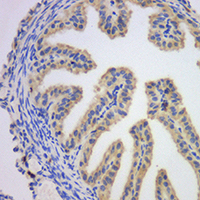Brief Reports
Vol. 64 No. 4 (2020)
LncRNA GClnc1 may contribute to the progression of ovarian cancer by regulating p53 signaling pathway

Publisher's note
All claims expressed in this article are solely those of the authors and do not necessarily represent those of their affiliated organizations, or those of the publisher, the editors and the reviewers. Any product that may be evaluated in this article or claim that may be made by its manufacturer is not guaranteed or endorsed by the publisher.
All claims expressed in this article are solely those of the authors and do not necessarily represent those of their affiliated organizations, or those of the publisher, the editors and the reviewers. Any product that may be evaluated in this article or claim that may be made by its manufacturer is not guaranteed or endorsed by the publisher.
Received: 23 July 2020
Accepted: 4 September 2020
Accepted: 4 September 2020
832
Views
578
Downloads
13
HTML









